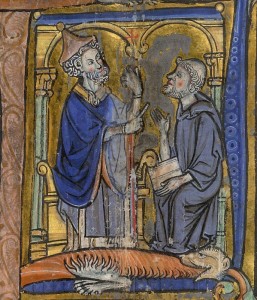In Washington, we are accustomed to the language and tactics of the world of politics: “political posturing”, “smear campaigns”, and catering to “special interest groups”. We know that the election of governmental officials can involve fierce rivalry and elections can be both rigged and contested. We may naively expect that these conditions have never existed in the Church, but the life of St. Damasus of Rome can attest to the opposite.
The son of a priest attached to the Church of St. Lawrence (the Basilica of San Lorenzo fuori le Mura) in Rome, Damasus may have been born, around the year 305, in what is now Portugal where his family originated. St. Constantine became Emperor when Damasus was just a year old, so in his childhood and youth, Christianity was made first legal and then the preferred religion of the Empire. It is perhaps for this reason that the Church experienced some of the same turmoil that existed in the political realm.
Like his father, Damasus entered the service of the church and served in the same church as his father. He was apparently the archdeacon when Pope Liberius was exiled by the Emperor Constantius II. Damasus accompanied him, but returned to Rome soon and had a major part in maintaining some stability in the church there during the reign of an “anti-pope”. Pope Liberius was reinstated and upon his death in 366, the 61-year-old Damasus was elected as his successor.
However, the turmoil of earlier years had not completely died down and rival factions of Christians pressed for their favorite candidates for office. Ursinus had a political following and managed to convince the Bishop of Tibur to consecrate him as the pope, contrary to the proper procedure. The outcry of both camps was great and eventually erupted into violence. Clubs and swords were used and it is said that 137 people were killed in the riot.
The Emperor Valentinian had to intervene to restore order (eventually by banning Ursinus and his closest followers to Gaul), but the undercurrent of discontent and revenge was present for the remainder of Pope Damasus’ life. His detractors accused him of murder and adultery (although he never married) and added to this, the friction with those Arians, Appolinarians, and other heretical groups who would have swayed the people of Rome away from Orthodox Christianity, made for a very turbulent pontificate.
One of the far-reaching acts of Pope Damasus was to appoint Jerome as his personal secretary and to encourage him to make a new, more accurate, translation of the Bible into Latin. St. Jerome’s Vulgate Bible was the primary Bible used by the Church in the West for hundreds of years. The second Ecumenical Council at Constantinople was held during Pope Damasus’ papacy, and he presided over the Council of Rome in 382 which established the canon of Scripture for Rome in agreement with that of North Africa established by St. Augustine.
St. Damasus was devoted to the veneration of the early martyrs of the Church and worked to keep their memory alive with the Christians of this new age. He worked to maintain and beautify the tombs of the martyrs. He (along with St. Ambrose of Milan) encouraged the appeals of the Christian Senators of Rome in urging the Emperor Gratian to remove the Altar of Victory from the Senate in Rome and other regulations to end the practice of pagan worship.
When we stand before God in the great Judgement at the end of time, we will not have to answer for the circumstances of our lives, but for how we lived in those circumstances and whether we followed Christ faithfully. St. Damasus will surely then be placed with the sheep at Christ’s right hand. In the midst of political rivalry and sectarian violence, he was a faithful shepherd of his flock; he rose above the turmoil and led his people in the way of Truth. St. Damasus passed to his eternal reward on December 11 in the year 384.
May St. Damasus remind those of us who live in the midst of political rivalries and turmoil that living our lives as faithful Christians is more important than any political belief, party, or office. Holy Damasus, pray for us.
